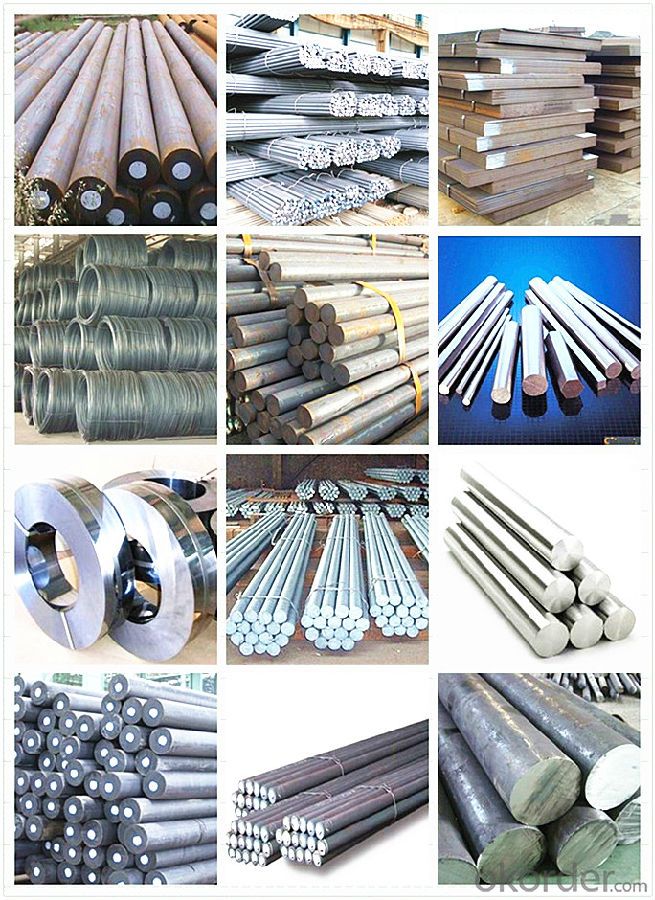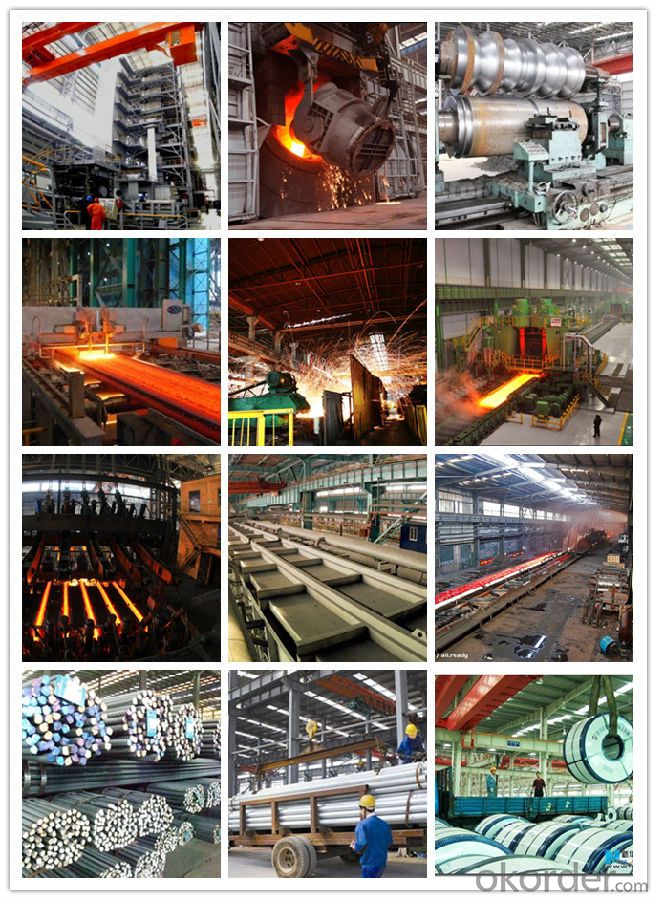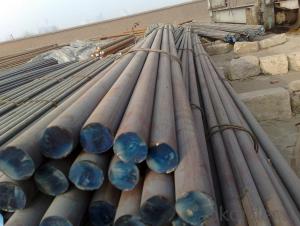Special Steel 5135 Alloy Steel Round Bars
- Loading Port:
- China main port
- Payment Terms:
- TT OR LC
- Min Order Qty:
- 30 m.t.
- Supply Capability:
- 10000 m.t./month
OKorder Service Pledge
OKorder Financial Service
You Might Also Like
Item specifice
Product information:
Standard | ASTM AISI | ||||||||||
Grade | 5135 | ||||||||||
MOQ | 1 Metric Ton | ||||||||||
Diameter | 8mm~1500mm | ||||||||||
Length | 6m,12m or as required. | ||||||||||
Diameter Tolerance | Within the allowable range or as required . | ||||||||||
Condition of delivery | Hot rolled,Cold Rolled or as required. | ||||||||||
Chemical Composition(%) | |||||||||||
C | Si | Mn | P | S | Cr | ||||||
0.30-0.37 | ≤0.40 | 0.60-0.90
| ≤0.035 | ≤0.035 | 0.90-1.20 | ||||||
Ni | Cu | ||||||||||
≤0.30 | ≤0.030 | ||||||||||
Mechanical Properties(In Quenching and Tempering) | |||||||||||
Tensile strength | Yield strength | Elongation | Reduction in Area | Impact | Hardness | ||||||
(σb/MPa) | (σs/MPa) | (δ5/%) | (ψ/%) | (J) | (HB) | ||||||
≥930 | ≥735 | ≥9 | ≥45 | ≥47
| ≤207 | ||||||
Product Show:

Workshop Show:

Shipping
1. FedEx/DHL/UPS/TNT for samples, Door-to-Door;
2. By Air or by Sea for batch goods, for FCL; Airport/ Port receiving;
3. Customers specifying freight forwarders or negotiable shipping methods!
Delivery Time: 3-7 days for samples; 5-25 days for batch goods.
Payment Terms
1.Payment: T/T, L/C, Western Union, MoneyGram,PayPal; 30% deposits; 70% balance before delivery.
2.MOQ: 1pcs
3.Warranty : 3 years
4.Package Informations: 1) EXPORT, In 20 feet (GW 25 ton) or 40 feet Container (GW 25 ton)
2)as customer's requirement
Why choose us?
(1) The leading exporter in China special steel industry.
(2) Large stocks for various sizes, fast delivery date.
(3) Good business relationship with China famous factories.
(4) More than 7 years steel exporting experience.
(5) Good after-sales service guarantee.
- Q:What are the main factors that affect the machinability of special steel?
- Several factors can influence the machinability of special steel. The composition of the steel itself is one of the main factors. Special steels often contain complex alloys that enhance their properties, such as strength or corrosion resistance. However, these alloying elements can also have a negative impact on machinability. Chromium, nickel, and molybdenum, for example, can make the steel harder to machine due to their hardening or abrasive properties. The microstructure of the steel is another factor that affects machinability. Special steels can undergo heat treatments to achieve desired properties, but these treatments can also alter the microstructure of the material. The presence of carbides or precipitates can make the steel harder and more brittle, leading to increased tool wear and poorer machinability. The hardness of the steel is also important. Harder steels generally have lower machinability as they are more resistant to cutting forces. High-speed steels are often used to counteract this issue. However, excessively hard steels may require specialized tooling or machining techniques to achieve satisfactory results. Impurities or non-metallic inclusions in the steel can disrupt the cutting process and reduce tool life and surface finish. Special steel manufacturers strive to minimize impurities and control inclusion content to improve machinability. Lastly, cutting parameters and machining conditions play a significant role in determining machinability. Factors such as cutting speed, feed rate, and depth of cut must be optimized to achieve the best balance between material removal rate and tool life. Coolant usage and chip evacuation are also crucial considerations to prevent excessive heat buildup and chip recutting, which can negatively impact machinability. In conclusion, the machinability of special steel is affected by factors such as composition, microstructure, hardness, impurities, and cutting parameters. Understanding these factors and employing appropriate machining techniques can help maximize productivity and produce high-quality components from special steels.
- Q:How does special steel contribute to reducing material waste?
- Special steel contributes to reducing material waste through its unique properties and manufacturing processes. Firstly, special steel is known for its high strength and durability, which allows for the creation of products that have a longer lifespan and require less frequent replacement. This reduces the amount of material waste generated from constantly discarding and replacing worn-out products. Moreover, special steel is often designed to be easily recyclable. Its composition and manufacturing techniques allow for efficient recycling, enabling the reuse of steel scrap and minimizing the need for new raw materials. This significantly reduces material waste by preventing the accumulation of discarded steel products in landfills. Additionally, special steel's versatility and customization options play a vital role in reducing material waste. By tailoring the steel's composition and properties to specific applications, manufacturers can optimize the use of materials and avoid unnecessary waste. Special steel's ability to be formed into complex shapes and sizes further enhances its efficiency, as it reduces the amount of excess material that would typically be wasted during the manufacturing process. In summary, special steel contributes to reducing material waste through its strength and durability, recyclability, and customization options. By promoting longer product lifespans, efficient recycling processes, and optimized material usage, special steel plays a crucial role in minimizing waste and promoting sustainability.
- Q:What are the properties of weathering steel?
- Weathering steel, also known as corten steel, possesses several distinctive properties. It exhibits high resistance to corrosion, making it suitable for outdoor structures without the need for protective coatings. Its unique composition allows for the formation of a stable rust-like appearance, providing an aesthetically pleasing and natural finish. Moreover, weathering steel has excellent strength and durability, making it ideal for various applications, including bridges, buildings, and architectural elements.
- Q:What are the different surface finishing techniques used for special steel?
- There are several surface finishing techniques used for special steel, including electroplating, passivation, pickling, and powder coating. Electroplating involves depositing a thin layer of metal onto the steel surface to enhance its appearance and provide corrosion resistance. Passivation is a chemical process that removes surface contaminants and forms a protective oxide layer on the steel, preventing corrosion. Pickling involves using acid solutions to remove surface impurities and oxide layers, resulting in a clean and smooth surface. Powder coating is a technique where a dry powder is applied electrostatically to the steel surface and then cured under heat, creating a durable and decorative coating.
- Q:How does special steel contribute to the mining equipment industry?
- Enhanced durability, strength, and resistance to wear and corrosion are crucial aspects of special steel's role in the mining equipment industry. Mining operations operate in challenging and harsh environments, making robust and reliable equipment essential. Special steel, designed specifically to withstand extreme conditions, improves the overall performance and longevity of mining equipment. The exceptional strength of special steel is one of its main advantages in the mining industry. Conventional materials quickly degrade under the intense forces of crushing, impact, and abrasion that mining equipment experiences. Special steel, however, offers superior strength properties, enabling mining equipment to withstand heavy loads without deformation or breakage. Additionally, special steel provides excellent resistance to wear and corrosion, addressing common challenges in mining operations. Regular steel is susceptible to quick wear from abrasive rocks and minerals, leading to equipment lifespan reduction and increased maintenance costs. Special steel, with its higher hardness and wear resistance, minimizes the impact of abrasive materials, prolonging the life of mining equipment and reducing downtime. Corrosion is another prevalent issue in the mining industry due to exposure to moisture, chemicals, and harsh environments. Special steel is formulated to resist corrosion, ensuring that mining equipment remains structurally sound and functional even in corrosive conditions. This corrosion resistance enhances the overall safety and reliability of mining operations. Furthermore, special steel allows manufacturers to customize and design mining equipment to meet specific needs. Different grades of special steel optimize the properties of mining equipment, enabling it to fulfill the unique requirements of various mining applications. In conclusion, special steel significantly contributes to the mining equipment industry by providing enhanced strength, durability, wear resistance, and corrosion resistance. Its utilization improves performance, extends equipment lifespan, reduces maintenance costs, and enhances safety in mining operations.
- Q:What is the purpose of annealing in special steel production?
- The purpose of annealing in special steel production is to improve the steel's mechanical properties and reduce its internal stresses. This process involves heating the steel to a specific temperature and holding it at that temperature for a certain period of time, followed by controlled cooling. Annealing helps to enhance the steel's ductility, toughness, and machinability, making it easier to work with and ensuring consistent and reliable performance in various applications.
- Q:How does special steel contribute to the agriculture industry?
- Special steel plays a crucial role in the agriculture industry by providing durable and high-performance materials for various agricultural machinery and equipment. These steels are specifically designed to withstand the harsh conditions and heavy workloads encountered in farming operations, resulting in increased efficiency and productivity. One of the primary applications of special steel in agriculture is in the manufacturing of tillage equipment such as plows, cultivators, and harrows. These implements require robust materials that can withstand the abrasion and impact of soil and rocks. Special steel provides the necessary strength and hardness to ensure that these implements can effectively break up the soil, improve soil quality, and prepare the land for planting. Additionally, special steel is extensively used in the production of machinery for planting, harvesting, and processing agricultural products. For instance, combine harvesters, which are vital for large-scale crop harvesting, heavily rely on special steel components for their cutting systems, threshing mechanisms, and grain handling systems. By using special steel, these machines can efficiently handle the demanding tasks of crop collection, separation, and storage. Moreover, special steel contributes to the agriculture industry by enhancing the longevity and reliability of equipment. Agricultural machinery operates in challenging environments that expose them to corrosive elements, moisture, and extreme temperatures. Special steel, often coated with protective layers, offers resistance against corrosion, rust, and wear, ultimately extending the lifespan of agricultural equipment. Furthermore, the use of special steel in the manufacturing of machinery leads to improved precision and accuracy in agricultural operations. Modern farming techniques increasingly rely on precision agriculture, which involves using advanced technologies to optimize productivity, reduce waste, and conserve resources. Special steel components enable more precise movements, better control, and increased accuracy in machinery, leading to improved efficiency and minimizing waste. Overall, special steel is vital to the agriculture industry as it provides the necessary strength, durability, and precision required for various agricultural machinery and equipment. By utilizing these high-quality materials, farmers can enhance productivity, reduce downtime, and achieve sustainable farming practices.
- Q:What are the main advantages of using special steel in the automotive racing industry?
- The main advantages of using special steel in the automotive racing industry are its high strength-to-weight ratio, exceptional durability, and excellent thermal conductivity. Special steel allows for the construction of lighter and stronger components, enhancing the overall performance and speed of racing vehicles. It also ensures greater safety for drivers by providing increased resistance to impact and fatigue. Furthermore, the superior thermal conductivity of special steel aids in dissipating heat generated during intense racing conditions, preventing overheating and maintaining optimal engine performance.
- Q:What are the main alloying elements in special steel?
- The specific type or grade of special steel can determine the main alloying elements present. Chromium, nickel, molybdenum, vanadium, tungsten, and cobalt are common alloying elements in special steel. These elements are incorporated into the steel to improve its properties, including corrosion resistance, strength, hardness, and heat resistance. Each alloying element has a distinct impact on the steel, enabling the development of specialized steel grades for diverse applications in industries like aerospace, automotive, oil and gas, and construction.
- Q:What are the different surface finishes available for special steel?
- There are several different surface finishes available for special steel, including polished, brushed, satin, matte, and textured.
1. Manufacturer Overview |
|
|---|---|
| Location | |
| Year Established | |
| Annual Output Value | |
| Main Markets | |
| Company Certifications | |
2. Manufacturer Certificates |
|
|---|---|
| a) Certification Name | |
| Range | |
| Reference | |
| Validity Period | |
3. Manufacturer Capability |
|
|---|---|
| a)Trade Capacity | |
| Nearest Port | |
| Export Percentage | |
| No.of Employees in Trade Department | |
| Language Spoken: | |
| b)Factory Information | |
| Factory Size: | |
| No. of Production Lines | |
| Contract Manufacturing | |
| Product Price Range | |
Send your message to us
Special Steel 5135 Alloy Steel Round Bars
- Loading Port:
- China main port
- Payment Terms:
- TT OR LC
- Min Order Qty:
- 30 m.t.
- Supply Capability:
- 10000 m.t./month
OKorder Service Pledge
OKorder Financial Service
Similar products
New products
Hot products
Related keywords
































